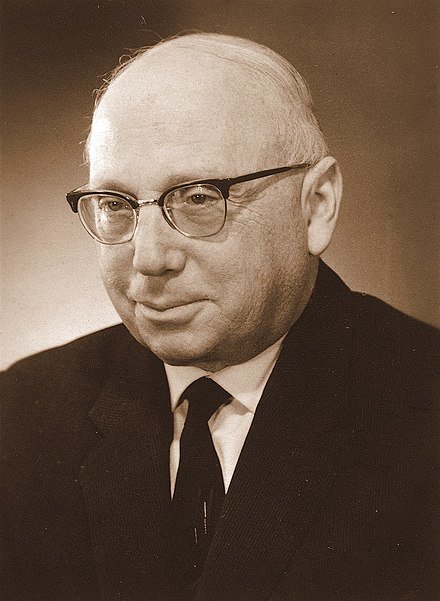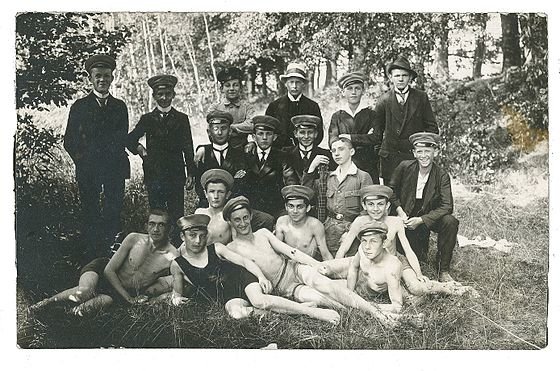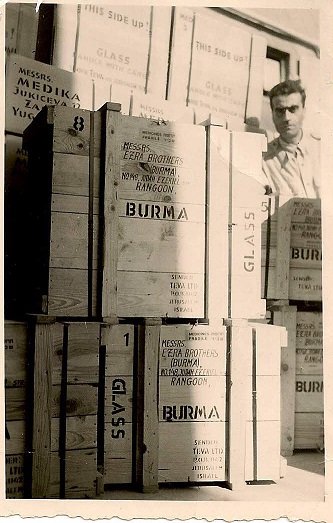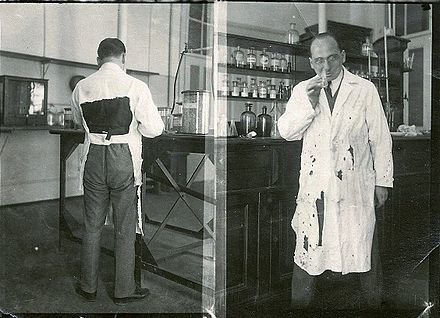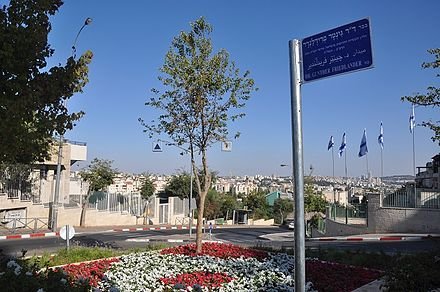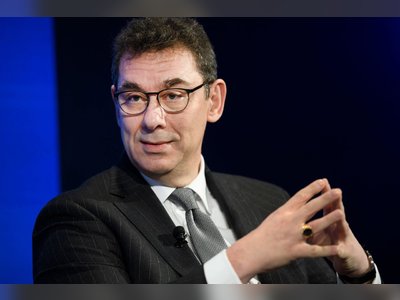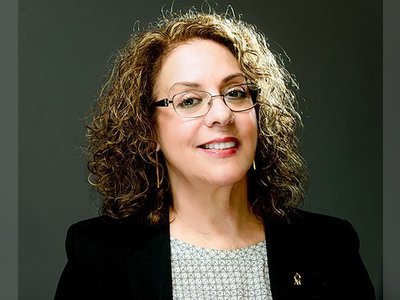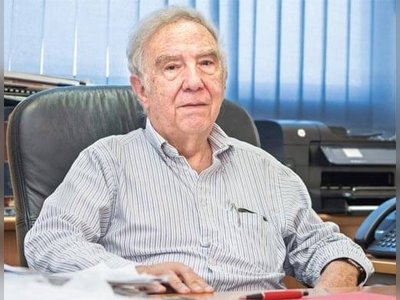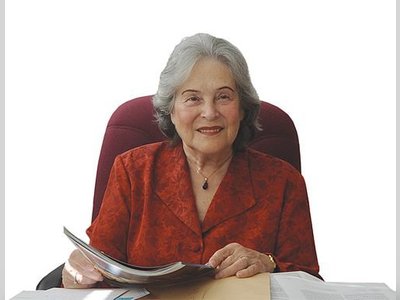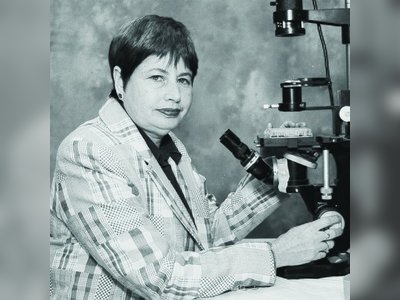Günther Friedländer: A Life of Scientific Innovation and Dedication
Günther Friedländer (April 8, 1902 - May 25, 1975) was a chemist, pharmacist, botanist, and pioneer in pharmaceuticals. He was the founder of the pharmaceutical company "Teva."
Early Life
Günther Friedländer was born on April 8, 1902, in Königshütte in Upper Silesia, Eastern Germany, an emerging coal-mining region. His mother, Paula (née Kubr), and his father, Aharon Adolf Friedländer, were involved in the shoe trade.
In 1912, when Günther was just 10 years old, the Friedländer family left Königshütte, located in an industrial area heavily reliant on coal, and relocated to Reichenberg, where a small Jewish community thrived.
At the age of 11, Günther joined the Jewish youth movement "Blau-Weiss" in the Reichenberg branch. Alongside his studies in natural sciences, Günther wrote stories and plays that reflected the events around him, the meaning of life, and his longing for the Land of Israel and Jerusalem.
His works included titles such as "In the Land of Our Ancestors," "I Shall Sing for Jerusalem," "The Spring Messenger," and "Jacob Dreams." In 1920, he was accepted into the pharmaceutical studies at the Friedrich Wilhelm University in Berlin, where he became involved in the Zionist student movement Kartell Jüdische Verbindungen (KJV). Upon completing his undergraduate studies, Friedländer moved to the University of Bern, where he earned his doctorate under the guidance of Prof. Alexandro Tschirch.
In July 1927, he received his Ph.D. in philosophy for his exceptional research in the fields of pharmacology-botany and pharmacology-chemistry. Following his graduation, Günther returned to Berlin and worked as an assistant to Dr. A. Rof in the University Institute of Pharmacy.
He managed the laboratory, mentored pharmacy students in their final two semesters, and was supervised by Dr. Rof in quantitative pharmacy analysis. In November 1929, he received his pharmacy diploma, signed by Dr. Schulz, the Prussian Minister for People's Welfare.
In April 1930, Günther moved to Görlitz to manage his aunt Elsa Kubr's pharmacy and laboratory, known as "Krönen Apotheke Görlitz" (established in 1883). Elsa Kubr was a World War I widow and the sole parent of her only daughter. Her husband, Max Kubr, Günther's cousin, and son of Günther's mother Paula, was a pharmacist and the owner of the Görlitz pharmacy.
He served in World War I, was injured, and succumbed to his wounds. On May 31, 1933, just four months after the Nazis came to power and two months after the degrading action taken against Jewish professionals in Görlitz, including Günther Friedländer, he set sail on a voyage to find a location for establishing a pharmaceutical plant in the Land of Israel, to be called "Teva." During his journey in the Land of Israel, Günther decided to establish the plant in Jerusalem and returned to Germany.
Zionist Activities
As a student at Friedrich Wilhelm University, Günther Friedländer was an active member of the Zionist student movement, with the goal of eventually immigrating to the Land of Israel. As a pharmacist in Görlitz, Günther was an engaged member of the Zionist circle and gave lectures on topics related to the Land of Israel.
With the rise of the Nazi regime and the experience of persecution, he decided that it was time to immigrate to the Land of Israel and establish a pharmaceutical facility there. On April 2, 1934, Dr. Friedländer and his first wife Charlotte arrived in the Land of Israel. Approximately a month later, his cousin and partner Elsa Kubr joined them.
Founding "Teva"
"We aim to help humanity through means we seek to extract from nature," wrote Günther Friedländer in 1923 at the age of 21 when he outlined his vision at the annual conference of "Blau-Weiss" in Hohenberg. The conference participants met Dr. Chaim Weizmann, who told them, "Industry is the basis and foundation of a place's development. In the Land of Israel, there is no industry.
Prepare yourselves for the needs of the Land of Israel, which requires experts in applied industry, and establish industry." Günther and his cousin Kurt Grünwald, both delegates at the conference, decided to implement Weizmann's words. Günther stated, "When the day comes for us to ascend to Palestine, we will establish a pharmaceutical plant there, and in the spirit of 'Blau-Weiss,' we will call it 'Teva.' We will produce medicines from the plants growing in Palestine – the Land of Israel."
In the Land of Israel, there were pharmacists who had not completed their formal studies in pharmacy and lacked certification. To assist them, Dr. Friedländer drafted a memorandum on May 5, 1934, outlining the essential points for establishing a clinic and a university institute in Jerusalem to serve as the basis for a school of pharmacy. The institute would provide professional courses to pharmacists who had not completed their formal studies and the pharmacy would serve as the basis for Hebrew pharmacopoeia.
On April 19, 1935, Günther sent a memorandum to Professor Otto Warburg, a leading figure in scientific research on nature in the Land of Israel and the head of the Botany Department at the Hebrew University. In it, he stressed the need to establish a pharmacy school in the Land of Israel to train competent pharmacists. He outlined a plan, including the necessary resources, space, equipment, instructors, and more. Dr. Warburg responded, claiming that Friedländer's proposed plan was too costly and lacked feasibility due to budget constraints.
Founding "Teva" in Jerusalem
Teva Pharmaceutical Industries was founded in Jerusalem on May 1, 1935, by Dr. Günther Friedländer and his cousin Elsa Kubr. The official name of the company was Teva Pharmaceutical and Chemical Industries Ltd. for the Middle East, Jerusalem (I.E.). The plant was established with an investment of 4,900 Palestine pounds, partly from their own capital and partly from loans arranged by the newcomers to Germany for the establishment of businesses.
Due to credit difficulties, banker Dr. Alfred Fuchs, a partner in Teva at 33%, became involved. In 1951, Fuchs initiated Teva's listing on the Tel Aviv Stock Exchange as a publicly traded company. In times of economic hardship, Friedländer often said that Teva's pharmaceuticals had a solid foundation because "a Jewish mother will always buy medicine for her children."
During World War II, the plant supplied medicines to Allied armies, especially the British forces stationed in the Middle East. As part of its connections with the British Army, Alan Gordon Cunningham, the High Commissioner for Palestine, visited the Teva plant. His visit significantly boosted Teva's standing in the pharmaceutical market.
Dr. Friedländer emphasized education and training of employees, and Teva's activities also included research and development. Among its products was acetylsalicylic acid, commonly known as aspirin.
In 1935, the company's first products were available for sale in pharmacies in Jerusalem and beyond. They included various tinctures and extracts of local medicinal plants such as artemisia (wormwood), eucalyptus, lemon, sage, and almond. For the first two years, Günther Friedländer and his cousin Elsa Kubr managed the company together.
In 1937, Friedländer and Kurt Grünwald established a partnership and acquired a building for the plant in Jerusalem. Their first products were sold in Jerusalem, then the products' distribution expanded to Tel Aviv and the rest of the country. In 1940, they registered their plant's name as "Teva."
Günther Friedländer left a significant mark in the field of pharmaceuticals in Israel. His dedication to research, education, and the production of high-quality pharmaceuticals laid the foundation for Teva's future success as a leading global pharmaceutical company.
Later Life and Legacy
After founding Teva, Günther Friedländer continued to be involved in the company's activities. However, he faced various challenges, including financial difficulties and the turmoil of World War II. Despite these challenges, he remained committed to his vision of producing high-quality pharmaceuticals in the Land of Israel.
Günther Friedländer's legacy lives on through Teva Pharmaceutical Industries, which has grown to become one of the world's largest generic pharmaceutical companies. Teva's commitment to providing affordable and accessible medicines aligns with Friedländer's original vision of helping humanity through pharmaceutical innovation.
In recognition of his contributions to the field of pharmaceuticals and his role in founding Teva, Günther Friedländer's name is remembered as a pioneer in the history of pharmaceuticals and the establishment of the pharmaceutical industry in Israel.
His dedication to scientific innovation and his determination to make a positive impact on society continue to inspire those in the pharmaceutical and healthcare industries.
- גינטר פרידלנדרhe.wikipedia.org
